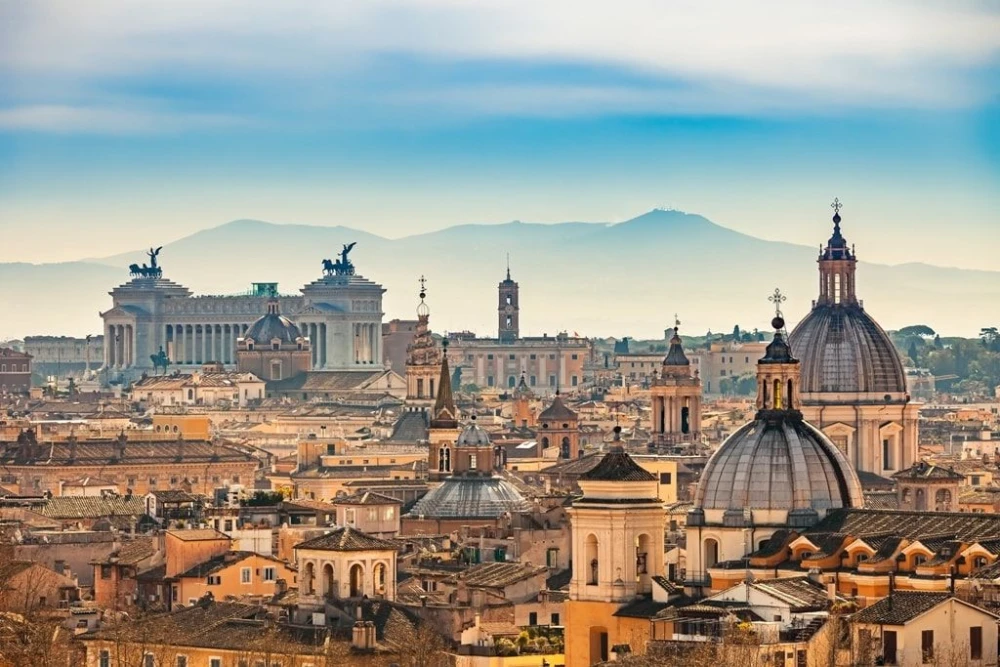15124, Maroysi, Athens, Greece

Malaga, Arrecife, Las Palmas, St. Cruz de Tenerife, Funchal (Madeira), Lisbon, Seville, Tangier, Civitavecchia (Rome)
Approach Ports

The southernmost large city in Europe, lies on the Costa del Sol (Coast of the Sun) of the Mediterranean, about 100 km east of the Strait of Gibraltar and about 130 km north of Africa. Málaga's history spans about 2.800 years, making it one of the oldest cities in the world. The walls of the Phoenician city are visible in the cellar of the Museo Picasso Málaga. The best-preserved Moorish citadel in Spain is located next to the Roman theater, which which dates from the 1st century BC and was rediscovered in 1951. The nearby caverns of Nerja provided refuge to humans 30,000 years ago and is a must-visit tourist attraction. Cruise guests can visit the old castles, the museums and the beaches or enjoy the scenery, sipping a Malaga sweet wine, accompanied with a plate of tapas.
Arequifa is a town and municipality in the Canary Islands (Spain) located in the center-east of the island of Lanzarote, whose capital has been since 1852. The town owes its name to the rock (where Arequifa in Spanish means "reef") that covers the beach located in the city. The city also gives its name to the nearby Arrecife Airport. It is located south of Teguiz, east of San Bartolome and borders the Atlantic Ocean.
Las Palmas de Gran Canaria, the capital of the island, is set amidst magnificent scenery composed of two bays and their beautiful beaches, in the north-eastern part of the island. Founded in 1478, the town is characterized by an important historical and cultural heritage, which is depicted in the district of Vegueta, the oldest quarter of the town, a UNESCO World Heritage Site since 1990, where you can see the Cathedral of Santa Ana, Casa Museo de Colón, Centro Atlántico de Arte Moderno & Museo Canario.
Tenerife is the largest the seven Canary Islands. It is one of the most important tourist destinations in Spain, with millions of tourists visiting it each year. Its landscape has been sculpted by a series of volcanic eruptions.
Madeira is located in the north Atlantic Ocean, 520 km from the African coast and 1.000 km from the European continent. Today, it is a popular year-round resort, noted for its wine, flowers, landscapes and embroidery artisans. Madeira's capital Funchal, on the island's south coast, rises straight up from the sea and enchants visitors, with its red roofs and hibiscus easing gently down the lower slopes of Pico do Arieiro to the ocean. Time given, take the cable car toMonte Palace, in a 15-minute ride up and over the old town of Funchal and the Ribeira de Joao Gomes valley. When in town, wander along the Old centre, with its port and promenade, quaint and narrow winding streets, shops, cafés, bars and restaurants and view "Worker's Market", the 15th-century cathedral, the Theatre, the Town Hall and the waterfront.
Lisbon, the capital of Portugal, on the southwest of the country, has been the main gateway for the rest of the planet for more than 19 centuries. Ships captained by Portuguese explorers like Bartolomeu Dias, Vasco da Gama and Ferdinand Magellan, skittered across the globe, hauling treasure home and making Lisbon a global capital. Draped across seven hills, Lisbon was once the center of a vast maritime empire that stretched from the west coast of Africa to the Spice Islands of the East Indies, until 1755, when a violent earthquake destroyed two-thirds of the city, leaving intact only the Alfama, the old Moorish quarter. Today, Lisbon is a stately city of Neoclassical buildings and wide plazas. Eternally linked to the sea, Lisbon's magnificent harbor is spanned by the longest suspension bridge in Europe. Among the city's landmarks are the iconic Castelo de São Jorge, the World Heritage Sites of Belém Tower and Jerónimos Monastery, both built in Lisbon's native Manueline architectural style.
Tangier is part of the Kingdom of Morocco, Africa's whitewashed gateway to Europe and the Mediterranean, a rich blend of cultures, exotic souks, colourful riads, the Kasbah, lively markets.. Wide palm-lined boulevards and humming souks are Tangier's distinctively Moroccan characteristics, but Spanish, French and Berber influences are found everywhere: watch the arched wooden doors, the hefty silver ornamentations, the tighly-woven carpets that tell tribal legends.You can take a tour at the caves of Hercules and the colourful souks of the Old Medina, the Kasbah and the majestic mountains of the Rif.

Our gateway to the Eternal City, Civitavecchia has served as Rome's seaport since the 13th century, boasting a long and venerable history. Its location near the modern city, made it a perfect vacation resort for emperor Trajan, who built a pleasure villa. while Bernini and Michelangelo designed the harbor fortifications. Yet the Eternal City, the ancient capital of the Western World and the center of Christianity for nearly 2.000 years, is our main reason to be here. YYou can visit the ruins of the Forum and the Colosseum, throw a coin in Fontana di Trevi to make sure you return to Rome one day, take a photo in front of the Vatican, view the splendors of the Sistine Chapel or climb the Spanish Steps, once the heart of Rome's Bohemian Quarter and enjoy a delicious gelato, in the glamorous area.
Itinerary







